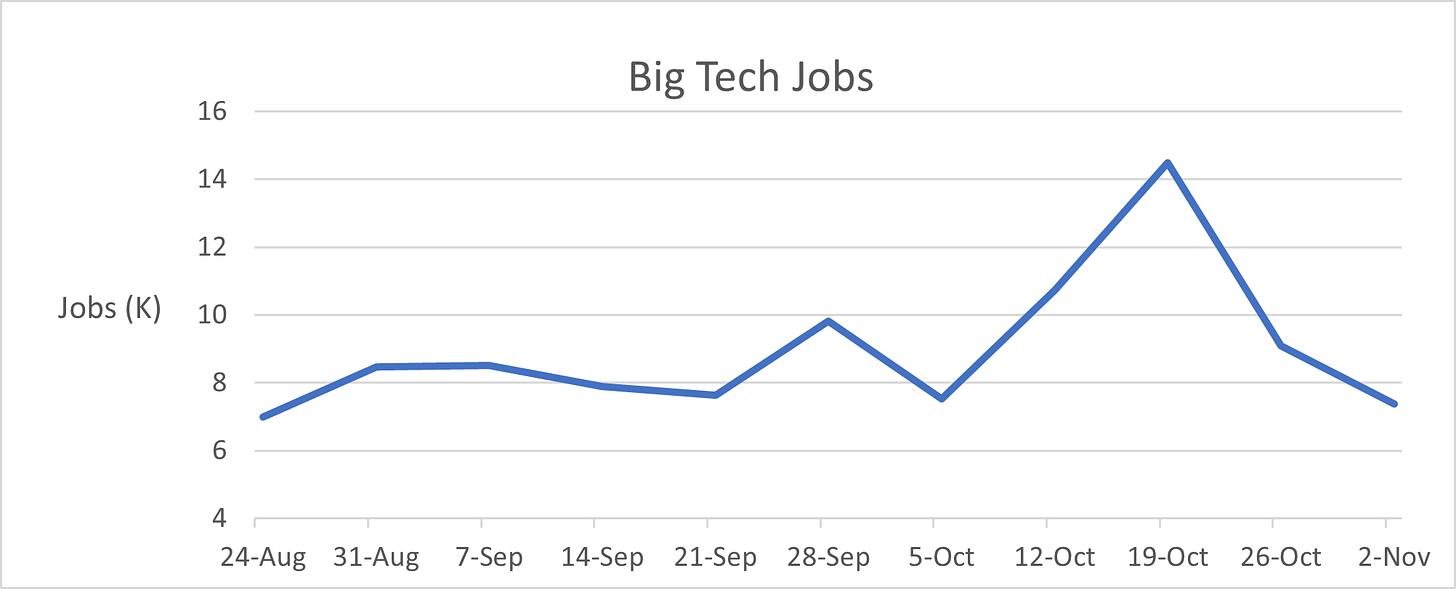Musk v Mullenweg
Daily sends emails.
Clearly speaks words.
Automattic buys texts.
Imagine Googling those phrases and hoping for insightful results. Let me tell you… it doesn’t work. It’s too generic, and in the case of the 3rd one, it feels wrong on multiple levels. You don’t buy texts, and it’s spelled automatic, dummy.
But I tried every possible combination of that 3rd one this week, looking for more details about a recent acquisition – Automattic’s acquisition of Texts. And finally, I think I’ve cobbled together enough of the story to weigh-in on two key questions:
Why are they doing this?
Will it work?
Before I get to my opinions, let’s start with the facts.
The Facts
Automattic is the parent company that owns Wordpress, WooCommerce, Tumblr, Pocketcast, and a few others. It’s a grab bag of internet businesses, loosely held together like a Warren Buffet holding co…. which is exactly what Automattic’s Founder, Matt Mullenweg, wants:
“We call ourselves a digital Berkshire Hathaway. Myself as the CEO of the company and some centralized services — including HR, legal, systems — try to serve these relatively independent teams that have a lot of autonomy for how to organize, run themselves, and iterate on their product. This middle part of the company, call it 200 people, is doing everything we can to remove barriers and help the rest of the company go faster.” (The Verge)
Last week, Automattic added Texts to the portfolio. Texts is basically a universal messaging app, so you can read/send messages there rather than in all the random apps you (sometimes) use.
Here’s how that’s helpful…

Imagine you are sitting on the couch, when you suddenly remember you got invited to a dinner, and it’s tonight. Your brain lurches to life, trying to remember where and when it is… oh yeah, it was Tim that texted you. But you scroll through your conversation with Tim and don’t see anything… was it a group text maybe? Or on Instagram?...
Texts (the app) solves that. All those messages, plus LinkedIn, Facebook, etc. – in a single app.
Automattic bought them for a reported $50M, but they aren’t the only ones paying up. The other group that has to pay? Users. Business users pay $30 per month, and individuals pay $15. And in exchange, users get powerful features like: message scheduling, group chat summaries, and AI-based drafts (“I’ve got a fever… and the only prescription… is more AI!”)
Why do this?
Let’s start with what Matt is saying publicly to justify the purchase. First, he talks about how he – as a user – has felt the pain of not having a product like this. He empathizes with us. He’s just like us! Second, he explains that he made investments in Texts, plus a a few competitors (Element, Beeper) to try to understand the industry better and see which one had the most promise. And he thought Texts was really promising. Third, he explains that while big tech incumbents might not love him sliding between them and their users, it’s a difficult time for them to do anything about it… because regulatory scrutiny on big tech hasn’t been this high in decades. And finally, he goes grandiose:
“I like to pick areas I feel are so fundamental to the human condition that I can work on this the rest of my life,” he says. “Self-publishing [Wordpress], commerce [WooCommerce], and messaging [Texts] covers a good chunk of all human activity, and they’re also three areas where I think an open-source solution is necessary for the long term.” (The Verge)
Reflections:
All of that might be true, but Matt’s explanation is like a side salad when you ordered a steak – nice, but nowhere near filling enough. You don’t buy a company that threatens big tech firms just because you think the regulatory environment is decent… especially if your passion for the space can be described as “humans do it”.
So here’s the part that I think is going unsaid… Matt is an incredibly friendly, non-controversial CEO (at least based on interviews I listened to), but he’s also got a lot in common with Elon Musk. Specifically, he bought a struggling social media platform he cared about, he tried and failed to turn it around, and he went on several monitization expeditions in search of a way out. Matt bought Tumblr in 2019, three years before Elon’s Twitter “adventure” began, and he even said:
“…a lot of what he’s been doing with Twitter are things we had already tried at Tumblr….”
Ok fine, but why is that relevant?
If you’ve been paying attention to social media recently, you would have noticed things shifting. And it doesn’t matter which platform you visit, the changes are there. Linkedin is seeing more posts, and more personal (non-business-y) updates than ever. Twitter has fewer users, so you see the same people posting more often, with incredibly chaotic ads mixed in. And Instagram becomes more video-centric by the day, with fewer photos and fewer posts from friends.
For those apps, you need lots of users and plenty of ad inventory to make things work.
Part of why I think Matt is doing this Texts acquisition is that he’s seeing the writing on the wall for apps that focus on one-to-many communication and ad-driven revenue models. In contrast, Texts allows you to be more connected with the small set of people you have genuine relationships (and ongoing conversations) with. And it charges you instead of serving you ads.
Will it work?
There are a few sub-questions here:
Can they attract users?
Absolutely. That core use case of centralizing messages is pretty easy for anyone to grok. Plus, Texts doesn’t have to do it alone… As discussed in Shopify is a Whale Shark, third parties flock to open-source solutions like this, extending functionality and driving even more value for users.
Will those users pay?
Some definitely will. It’s especially important to have that business option available, because Texts product documents seem to spend a lot of time emphasizing the security and reliability of message data. Enterprises will gobble up that message, helping subsidize non-business users.
Can they hold-off attacks from big tech?
I agree that the regulatory pressure makes it safer to be Texts, but that doesn’t mean there won’t be a shit ton of arrows flying in Texts’ direction on day one. Meta could decide not to allow WhatsApp messages through, but with enough users on Texts, that might backfire and hurt WhatsApp usage, pushing users to try other platforms instead of WhatsApp. Alternatively, Meta might try to launch their own Texts competitor, but it’s more likely that multiple messaging providers would attack Meta and cutoff access in that case (because the providers all compete directly with each other, and only indirectly with Texts). So basically, yes, I think Texts can hold-off the attacks.

There’s only one thing that I haven’t seen sufficiently answered (even for myself)… will they make Texts work on mobile? Yeah, believe it or not, they are PC-only for now, because checking multiple messaging services all the time (so you see a message the moment it arrives) requires lots of power, crushing your phone’s battery life. Although Matt has said he thinks they’ve cracked the code and have a “path” to a mobile app, a “path” is not an app. This will only work if they can make mobile work ASAP.
Bonus Bullets
Quote of the Week:
"Doesn't matter how many times you fail; you only have to be right once."
— Mark Cuban
Quick News Reactions:
Disney bows to Peltz – I wrote a few weeks ago about the activist investor (Peltz) clamoring for change at Disney. And here we have some change… Plus a board seat or two for good measure.
The Career Doctor will see you now – LinkedIn is going to use GPT4 to power a job seeker coach. You can use it to scan job descriptions and get insight into whether you’d be a good fit. Because more and more of the hiring/screening process is automated (they use bots too!), it’s only right that we give job seekers similar tools to make it a fair fight.
Ambitious App Alert – Adam Mosseri, who leads Instagram, announced his goal is for Threads to be the “de facto platform for public conversations online”. It’s hard to square that with his prior comments that they aren’t going to encourage news and political content, which drive a huge chunk of conversations.
Waymo x Uber – The two firms announced a partnership in May, and are now finally offering autonomous vehicle ride hailing in Pheonix. This is awesome, and it’s an acknowledgement of where their strengths lie. Uber abandoned internal self-driving efforts, and Waymo’s ride-hailing algorithms are years behind Uber.
New CEO @ Magic Leap – They hired Ross Rosenberg, a former M&A leader who’s worked at several hardware/networking firms in the past. It seems like they might try to be like the Cisco of old, growing like crazy through acquisition. They definitely needed a new strategy, so this doesn’t seem like a bad one to try.
Tech Jobs Update:
Here are a few things I’m paying attention to this week:
Big Tech Job Posts: LinkedIn has 7,836 (-18.8% WoW) US-based jobs for a group of 20 large firms (the ones I typically write about — Google, Apple, Netflix, etc.).
Graph: Layoffs since covid (Source: Layoffs.FYI). Note that this is showing in-progress Q4 numbers.




